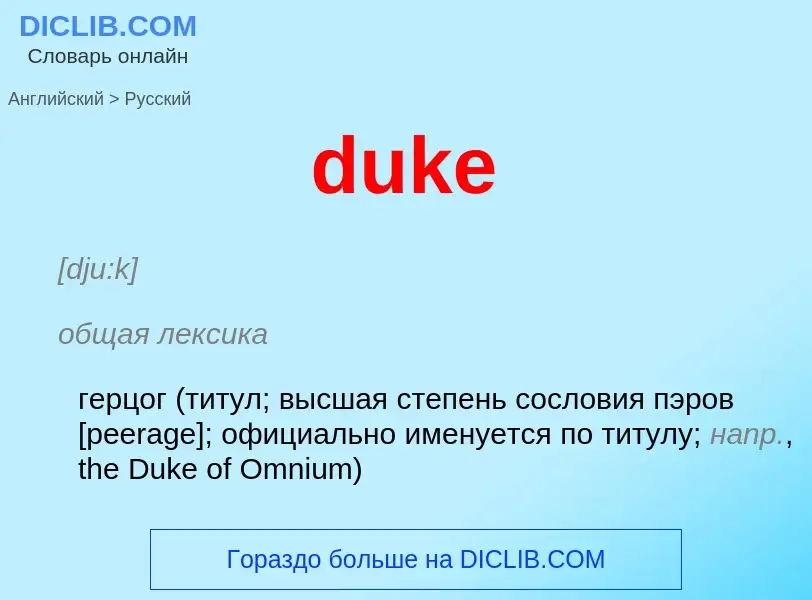Vertaling en analyse van woorden door kunstmatige intelligentie ChatGPT
Op deze pagina kunt u een gedetailleerde analyse krijgen van een woord of zin, geproduceerd met behulp van de beste kunstmatige intelligentietechnologie tot nu toe:
- hoe het woord wordt gebruikt
- gebruiksfrequentie
- het wordt vaker gebruikt in mondelinge of schriftelijke toespraken
- opties voor woordvertaling
- Gebruiksvoorbeelden (meerdere zinnen met vertaling)
- etymologie
duke - vertaling naar Engels
[dju:k]
общая лексика
герцог (титул; высшая степень сословия пэров [peerage]; официально именуется по титулу; напр., the Duke of Omnium)
синоним
существительное
общая лексика
герцог
род хереса
сленг
кулак
рука
[,rɔɪtl'dju:k]
общая лексика
королевский герцог, герцог - член королевского семейства [Royal Family] (высший титул пэра [peer]; в наст. вр. их пять: герцог Эдинбургский [Duke of Edinburgh], герцог Корнуэльский [Duke of Cornwall], герцог Йоркский [Duke of York], герцог Глостерский [Duke of Gloucester], герцог Кентский [Duke of Kent])
Definitie
Wikipedia

Duke is a male title either of a monarch ruling over a duchy, or of a member of royalty, or nobility. As rulers, dukes are ranked below emperors, kings, grand princes, grand dukes, and sovereign princes. As royalty or nobility, they are ranked below princes and grand dukes. The title comes from French duc, itself from the Latin dux, 'leader', a term used in republican Rome to refer to a military commander without an official rank (particularly one of Germanic or Celtic origin), and later coming to mean the leading military commander of a province. In most countries, the word duchess is the female equivalent.
Following the reforms of the emperor Diocletian (which separated the civilian and military administrations of the Roman provinces), a dux became the military commander in each province. The title dux, Hellenised to doux, survived in the Eastern Roman Empire where it continued in several contexts, signifying a rank equivalent to a captain or general. Later on, in the 11th century, the title Megas Doux was introduced for the post of commander-in-chief of the entire navy.
During the Middle Ages the title (as Herzog) signified first among the Germanic monarchies. Dukes were the rulers of the provinces and the superiors of the counts in the cities and later, in the feudal monarchies, the highest-ranking peers of the king. A duke may or may not be, ipso facto, a member of the nation's peerage: in the United Kingdom and Spain all dukes are/were also peers of the realm, in France some were and some were not, while the term is not applicable to dukedoms of other nations, even where an institution similar to the peerage (e.g. Grandeeship, Imperial Diet, Hungarian House of Magnates) existed.
During the 19th century, many of the smaller German and Italian states were ruled by dukes or grand dukes. But at present, with the exception of the Grand Duchy of Luxembourg, there are no dukes ruling as monarchs. Duke remains the highest hereditary title (aside from titles borne by a reigning or formerly reigning dynasty) in Portugal (though now a republic), Spain, and the United Kingdom. In Sweden, members of the Royal Family are given a personal dukedom at birth. The Pope, as a temporal sovereign, has also, though rarely, granted the title of duke or duchess to persons for services to the Holy See. In some realms the relative status of "duke" and "prince", as titles borne by the nobility rather than by members of reigning dynasties, varied—e.g., in Italy and Germany.
A woman who holds in her own right the title to such duchy or dukedom, or is married to a duke, is normally styled duchess. Queen Elizabeth II, however, was known by tradition as Duke of Normandy in the Channel Islands and Duke of Lancaster in Lancashire.


.jpg?width=200)
